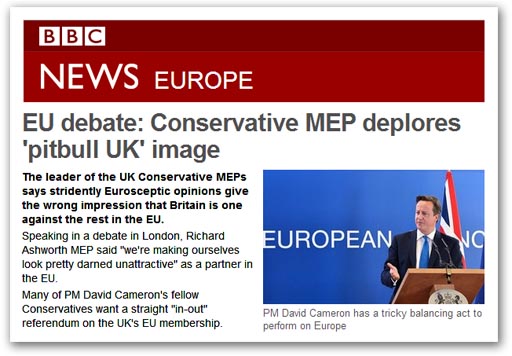That aside, one cannot help but contrast the difference in treatment between the eurosceptic UKIP, and the europhile wing of the Conservative Party. On the one hand, we have the BBC reporting onAmy Lame talking about "political oddness" – which is about as near as UKIP gets to any recent publicity.
Yet, all it needs for the europhile case to be aired is for the leader of the UK Conservative MEPs, Richard Ashworth, to speak at what is labelled a "debate", this one organised by the europhileBusiness for New Europe in London. Then, he gets full-frontal treatment on the BBC website, where he is allowed to deplore the UK's "pitbull" image.
Says Ashworth, according to the BBC, stridently Eurosceptic opinions give the wrong impression that Britain is one against the rest in the EU, with the BBC helpfully conveying his view that, "we're making ourselves look pretty darned unattractive" as a partner in the EU.
Mr Ashworth wants to see "an evolutionary solution" to current problems, rather than "the nuclear option" of withdrawal, and asserts that a lot of nations were on the UK's side, including Sweden, Finland and Denmark.
However, although the BBC styles this as a debate, its organisers actually call it a panel, with no attempt to represent a wide spectrum of views, or offer anything that could approach balance.
The nearest thing one might get to the "other side" – apart from Bill Cash, whose input was not reported - was Conservative MP Andrea Leadsom, of the "Fresh Start" group. Her version of euroscepticism is that Britain "needs to be at the heart of the EU", but also "needs to articulate a new relationship" with its EU "partners".
Amongst other things, Leadsom believes it would be feasible to negotiate a new "multilateral" arrangement on justice and policing with the rest of the EU, though conceded that it could be difficult.
However, the BBC helpfully "balanced" this dissident view with a contribution from Lord Kinnock, former Labour Party leader and ex-commissioner. Amazingly, he attacked the Conservative drive to repatriate powers from Brussels.
He doubted whether the Nordic countries, with their generous social welfare, would accept the UK unilaterally diluting workers' rights and still remaining in the EU single market. That would distort the market's level playing field, he argued.
He also dismissed the idea of a special "multilateral" deal on justice and policing for the UK, saying the EU had no mechanism to do that. Such changes in the UK's relationship with the EU would have to be negotiated with the other EU countries.
Now, it may well be that Farage and his party are so lightweight that their views on the European Union are scarcely worth listening to. And it is certainly the case that you would struggle to find on its website the party's views on key issues pertaining to the EU – such as Britain's membership of the EEA. But it also does seem that the only formal anti-EU political party is being grossly under-represented in the current discourse.
Nor is it the case that we are hearing from any other anti-EU groups (Better Off Out springs to mind), which means there is no "debate" at all, despite the BBC purporting to be reporting on one.
Much the same lack of balance is visible in the print media with, for instance, no corrective allowed to the open lies being told about Norway and influence over EU rules.
The best we get, of late, is Thomas Pascoe, who is at least allowed to say that, the "constraint without influence" argument made by the "in" camp is a possible outcome of a Brexit. It is not an inevitable one. That is worth keeping in mind over the coming weeks and months.
Weak as ditchwater, that's as good as it gets, with the Financial Times still pedalling the lie on Norway or Switzerland, that "both countries have to accept the rules of the club, while exercising no voice in making them".
It really doesn't that UKIP has been silent on this issue, and its loudest voice has been heard most recently on gay marriage. It is all very well it seeking to convince people that it is no longer a single issue party, and has policies on a wide range of subjects, but it would be useful to hear, on occasions, what its policy on that single issue actually was.
What we are getting, though, is another illustration of what it is going to be like come a referendum campaign. The voice of the true eurosceptic will be submerged in the babble, and the lies will dominate, unchecked – with the willing help of the BBC and the rest of the media.
We cannot profess to being surprised though. This was always going to be the case. When it comes to arguments on whether we should leave the EU, there never was going to be a level playing field.
COMMENT THREAD
